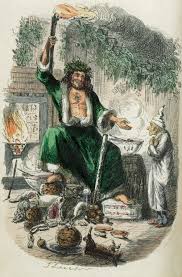Animal, Vegetable, Mineral: Dickens and the Underdog
This post has been contributed by Catherine Burgass, a Lecturer and Honorary Research Fellow at Staffordshire University with a specialism in local literary studies. She also teaches at Keele University Continuing Education. The use of animal metaphors for mechanical or human subjects is a common...
“I and my fellows are ministers of Fate”: Dickens and his beloved Ariel, Priscilla Horton
This post has been contributed by Katie Bell. Katie is a PhD student at the University of Leicester. Her thesis is titled “The Diaspora of Dickens: Death, Decay and Regeneration”, the focus of which is the intertextuality of Dickens’s works and 20th century American texts...
Article in Progress: “Then, I go among the Germans”: Klein Dorrit (1934)
This post has been contributed by Andrea Schmidt, who is currently a Visiting Instructor of German at Willamette University. She has research interests in nineteenth century British/German literatures and contemporary film. In an era of rising nationalism, a Czech born director brought an adaptation of...
Man and Meat: A Christmas Carol’s Cannibalistic Menace in Historical Perspective
This post has been contributed by Lydia Craig. First the villain and then the hero of Charles Dickens’s A Christmas Carol (1843), the cold-hearted and wealthy businessman Ebenezer Scrooge initially refuses to empathize with or financially contribute towards the nourishment of London’s poor until bullied,...
Dickens Society Blog: Call for Posts
Last year, the Dickens Society launched the Dickens Society Blog, aimed at disseminating Dickensian research both amongst the Society’s membership and to the larger academic community. We welcome ongoing submissions from researchers at any career level on any topic relating to Dickens’s life, work, or...
Victorian Passions: An Exhibition and Symposium Honoring The Mark Samuels Lasner Collection at the University of Delaware Library
Starting 14 February, when walking up to the second floor of the University of Delaware’s Morris Library you will encounter a Kelmscott Chaucer; the copy of The Stones of Venice Ruskin gave to Thomas Carlyle; Anthony Trollope’s copy of Forster’s The Life of Charles Dickens;...
The Man Who Invented Christmas to Become a Feature Film
This post has been contributed by Gina Dalfonzo. In 2011, historian and author Les Standiford published The Man Who Invented Christmas: How Charles Dickens’ A Christmas Carol Rescued His Career and Revived Our Holiday Spirits. The book was an insightful, very thorough exploration of the...
Past, Present, and Future: The Dickensian (Christmas) Spirit
This post has been contributed by Catherine Quirk. In The Lives and Times of Ebenezer Scrooge (1990), Paul Davis argues that A Christmas Carol adapts itself to each historical era; that is, since its publication subsequent generations of readers, play-goers, listeners, and viewers have been...
Gift-Giving in the Proper Dickens Spirit
This post has been contributed by Clara Defilippis. Throughout Little Dorrit, Dickens peppers his narrative with individuals who give and receive favors and gifts. In his treatment of presents and tokens within the novel, Dickens contrasts the prideful and manipulative behavior of Mr. Dorrit...
How Dickens Invented Christmas — and Why it Matters
Professor Goldie Morgentaler recently gave this public lecture on A Christmas Carol at the City Hall in Lethbridge. Her talk lays out the history of A Christmas Carol, which was not intended as a feel-good fairy-tale but as an enraged tirade against the evils of...
- Previous Page
- 1
- …
- 11
- 12
- 13
- 14

